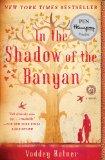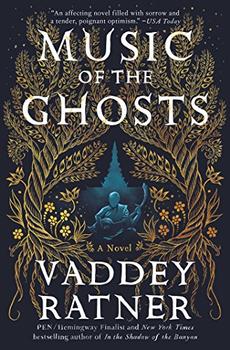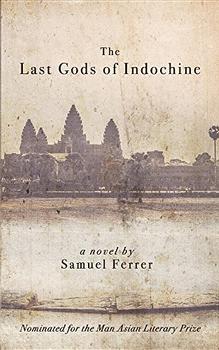Summary | Excerpt | Reading Guide | Discuss | Reviews | Beyond the book | Read-Alikes | Genres & Themes | Author Bio

A Novel
by Vaddey RatnerIt might be hard to wrap one's mind around the concept of genocide, but it sure is important to do so. After all, those who ignore history are doomed to repeat it. The massive purge that occurred during a very short window of time - between 1975 and 1979, just after the Cambodian Civil War - had all the signs of a genocide: millions were killed because they looked different or didn't conform to predetermined ideas of what the "ideal Cambodian" should be like. Seven-year-old Raami Ayuravann, the narrator of the moving novel, In the Shadow of the Banyan, belongs to the royal class and is living her life in relative luxury in Phnom Penh, when the Khmer Rouge (see "Beyond the Book") captures the city in 1975.
Raami is forced to dislocate to the countryside along with her family, and under extreme conditions, the family fights to survive together. Forcing everyone to conform to an agrarian lifestyle, the Khmer Rouge displaces millions of Cambodians like Raami's family, moving them to the countryside and having everyone perform hard labor for the most meager of rations. As we follow the novel's narrative, we slowly find out who will eventually remain safe in the "shadow of the banyan tree."
This is Vaddey Ratner's debut novel, a moving tale made all the more affecting because it is not overly manipulative. (Though, the novel does seem to have its share of overwrought metaphors: "He looked up, his eyes brimming with monsoon rains, like the inundated rice paddies surrounding the temple." Of course, these metaphors might be forgiven as the product of a child's overactive imagination.) The novel shines in its narration of folk tales from the Reamker, the Cambodian equivalent of the Hindu epic, the Ramayana. Banyan is especially heart-wrenching because of the everyday simplicity of Raami's basic concerns - her insecurity over the limp caused by polio; and her worries for her family's safety. Raami's attempts to cocoon her universe seem ever more pathetic because we know they are destined to fail, shaped as they are by larger events beyond any one person's control. "The problem with being seven," Raami remembers, "is that you're aware of so much, and yet you understand so little." She is aware that the world as she has known it is slowly disintegrating yet she doesn't quite understand why or how.
Raami is the perfect vehicle for telling the horrific tale of Cambodia's genocide. Through her voice, Ratner is able to whittle down a complex multi-layered story to its basic essence. This is not an epic Killing Fields kind of a story. But in detailing the effects of the genocide on one family and by narrating it through one child's perspective, the effect is just as searing. Largely autobiographical in nature, the novel must have served as a cathartic release for Ratner who has said she painted over only some of the details in the story. Like Raami, Ratner too suffered the after-effects of polio, although unlike Raami, she was five when the Khmer Rouge took over Phnom Penh. Ratner has said she "wanted to articulate something more universal, more indicative... of the human experience - our struggle to hang on to life, our desire to live, even in the most awful circumstances." That Raami triumphs above such horrific tragedy, spirit largely intact, is proof that humanity wins in the end.
![]() This review was originally published in The BookBrowse Review in September 2012, and has been updated for the
June 2013 edition.
Click here to go to this issue.
This review was originally published in The BookBrowse Review in September 2012, and has been updated for the
June 2013 edition.
Click here to go to this issue.

If you liked In the Shadow of the Banyan, try these:

by Vaddey Ratner
Published 2018
This "novel of extraordinary humanity" (Madeleine Thien, author of Do Not Say We Have Nothing) from New York Times bestselling author Vaddey Ratner reveals "the endless ways that families can be forged and broken hearts held" (Chicago Tribune) as a young woman begins an odyssey to discover the truth about her missing father.

by Samuel Ferrer
Published 2016
Nominated for the Man Asian Literary Prize ("The Booker of Asia")
"A sublime tale told by a master storyteller, steeped in the lore of old. Ferrer's conjuring of romantic Indochine is a journey that lures, stirring up ghosts in a wild phantasmagoria, reckoning with forces both entwined and eternal." - Angela Kan, Travel Host & Writer, The ...
Your guide toexceptional books
BookBrowse seeks out and recommends the best in contemporary fiction and nonfiction—books that not only engage and entertain but also deepen our understanding of ourselves and the world around us.